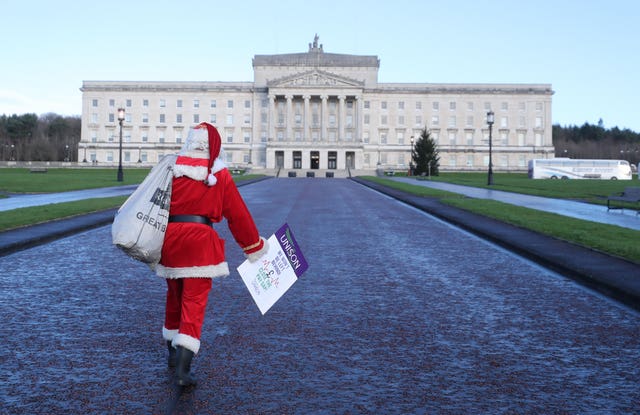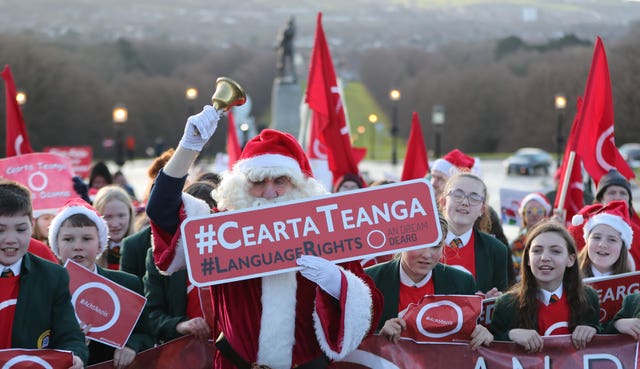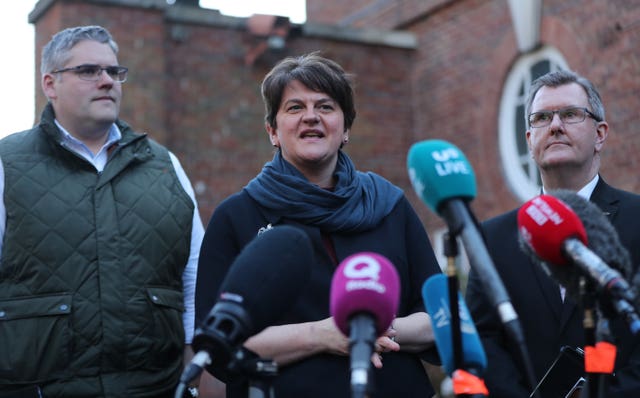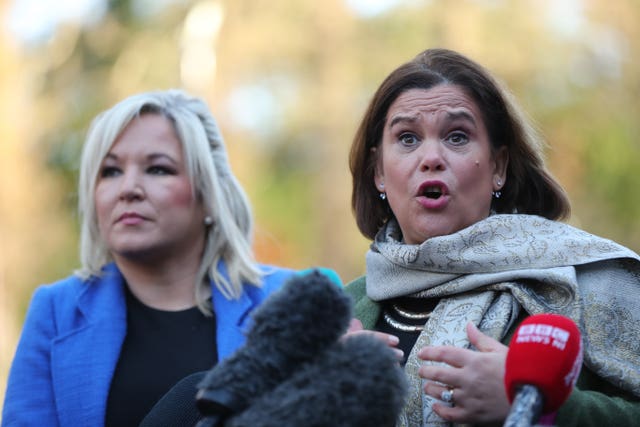
The electorate in Northern Ireland has delivered a loud message to Stormont’s politicians that the powersharing crisis must end, the Secretary of State has said.
As the latest political bid to revive the dormant institutions began in Belfast, Julian Smith said he sensed the main parties had realised the people’s number-one priority was the floundering public services that have been left rudderless as a result of the three-year governance impasse.
Mr Smith held bilateral meetings with the leaders of the five parties at Stormont House on Monday as a new talks initiative process got under way ahead of a looming deadline in January. Roundtable talks involving the UK and Irish governments and all the parties are scheduled for later this week.
If a devolved executive is not resurrected by January 13, legislation that gives the civil service extra powers to run public services will expire, and Mr Smith will be under a legal duty to call a snap Assembly election.
The region’s two main parties, the DUP and Sinn Fein, entered the latest negotiations on the back of disappointing election results, with many interpreting the general election as the public passing judgment on their failure to restore the Assembly.
A spiralling crisis in the region’s health service has heaped further pressure on the politicians to get back to work. Healthcare workers, who demonstrated at Stormont on Monday, will go on strike this week in protest at pay restraints and staffing shortages.
While the DUP and Sinn Fein will need to settle their own differences before an Assembly can return, both parties have made clear that any agreement should also come with a financial commitment from the UK Government – money they want to use to address the problems in the health service.
After his meetings, Mr Smith described the mood as “positive” and said he detected a willingness to strike a deal. He said the Government was willing to do “everything it can” to support any fresh investment in public services.
“I think there were some very interesting results in Northern Ireland,” he said of the election.
“The sense that I get today is that every party has had time to reflect and there are serious issues to reflect upon and the biggest message they got on the doorstep essentially wasn’t about Brexit, wasn’t about their own parties’ individual policies but it was the fact that this executive and assembly has remained dormant for 1,000 days and I think my sense from everybody is there was a realisation that that was not a sustainable position.
“The Good Friday Agreement was something that everybody worked incredibly hard on and this symbol, this empty symbol at the top of this hill (Stormont’s Parliament Buildings) cannot go on any longer – we have to govern and we have to get our Northern Ireland parties governing in the best interests of Northern Ireland citizens.”
Powersharing imploded almost three years ago amid a row about a botched green energy scheme.
That rift soon widened and refocused on long-standing disputes over issues such as the Irish language and same-sex marriage. With same-sex marriage having been legislated for at Westminster earlier this year, the wrangle over the Irish language remains the key stumbling block.
The parties are also trying to agree reforms to Assembly structures – in particular the contentious petition of concern voting mechanism that effectively hands large parties the ability to veto changes, even if a majority support them.

Commenting on his own future, Mr Smith said the Prime Minister had asked him to get on with the talks and drive towards a successful outcome. He appeared to rule out the suggestion that some of the big ticket issues could be parked, or moved into a separate process, to enable the restoration of devolution immediately.
“The biggest tragedy for this talks process would be for this assembly to get up and running and then fail,” he said. “We have to address head-on the major issues that need resolving. I think the idea that we just paper over the cracks, get it up and running and it fails in a few weeks or a few months is not a good one.”
After meeting Mr Smith, DUP leader Arlene Foster acknowledged that voters had made it very clear that they wanted Stormont back up and running.
“I listened very carefully during the election campaign and right throughout the election campaign there was a desire to get Stormont back up and running again,” she said.
“Therefore we are here to try to make that happen. I hope all the other parties will too.”
She agreed that the election had created a new “momentum” towards finding a resolution.
“I hope we can grasp it immediately,” she said.
“I very much hope that at the beginning of the new year we will have an assembly up and running and one that can deal with all the issues we have talked about today.”

Ms Foster, who said she did not believe a new Assembly election was necessary before 2022, stressed the need for an injection of money. She also said reforms were required to ensure that any new executive was “sustainable”.
Sinn Fein President Mary Lou McDonald said there should be no “red lines” in the negotiations.
“It’s not helpful in the course of discussions for people to be setting out red lines or talking about red lines,” she said.
“That’s not how we understand these matters or how we articulate it. These are matters that have to be resolved. And it’s not about the political parties, it’s about citizens, it’s about people in particular who live here in the north.
“At a time of great challenges, because Brexit still looms large, there is an obligation to deliver on issues. So I don’t think anybody should be digging themselves into trenches and refusing to acknowledge and to honour other people’s rights.
“So, yes, the Irish language is an issue that I believe we can reach agreement, so too the issue of public services. We should never ask people to have to make a choice between those things.

“In any civilised, democratic system you recognise citizens’ rights and you also make provision for health, for education and for all the things we rely on in our day-to-day lives.”
She said any executive formed had to be “inclusive”, with all parties involved.
“We need a clear commitment from parties to really show up for work and form an executive,” she said.
Ms McDonald said the UK Government needed to deliver a “big cash injection” to help tackle the problems facing public services, in particular the health service.
“We fully realise and have known for the last number of years the frustrations of people at the failure of the Executive and Assembly to function and to deliver for all of our citizens, we believe now is a crucial and pivotal moment for people to step up and give leadership,” she said.
Irish Foreign Affairs Minister Simon Coveney pledged to work day and night, before and after Christmas, to help the Stormont parties get a deal over the line.
He said Wednesday’s planned strike action by nurses represented a “reality check” for politicians.
“Now is the time to get Stormont back up and running,” he said.
“We have had three years without any form of devolved government in Northern Ireland.
“It is far too long and I think we have seen the consequences of that in terms of the polarisation of politics across Northern Ireland, not just amongst political parties but also within communities.”
Irish language activists also staged a protest outside Stormont House as the talks were taking place inside.

Nearby Unison health union members sang carols, with the words changed to highlight their demands for pay parity with workers in the rest of the UK.
Scores of children from Irish language schools wore Santa hats as they marched to the front of Parliament Buildings calling for legislation.
Sinn Fein has made an Irish Language Act a prerequisite of any deal to restore devolution.
The DUP has expressed a willingness to legislate to protect the language, but only as part of broader culture laws which also include the Ulster Scots tradition.
Ahead of the renewed political talks involving the parties, senior health leaders, representing doctors and nurses in Northern Ireland, issued a statement outlining their serious concerns about the situation in the health and social care system.
The British Medical Association, Royal College of Emergency Medicine NI, Royal College of Surgeons of England, Royal College of General Practitioners (NI), Royal College of Nursing, Royal College of Psychiatrists NI, the Royal College of Radiologists UK and the Northern Irish Board of the Royal College of Anaesthetists – which collectively represent thousands of medical and nursing professionals in Northern Ireland – said they were taking the “unusual” step of issuing a joint statement due to the severity of the situation.
The groups called on politicians to get the devolved institutions up and running again with immediate effect.


Comments: Our rules
We want our comments to be a lively and valuable part of our community - a place where readers can debate and engage with the most important local issues. The ability to comment on our stories is a privilege, not a right, however, and that privilege may be withdrawn if it is abused or misused.
Please report any comments that break our rules.
Read the rules here